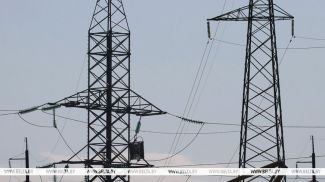MINSK, 19 November (BelTA) – Belarusian President Aleksandr Lukashenko has given an interview with BBC, BelTA has learned.
The interview lasted for about an hour. The interviewer was Steven Rosenberg, Moscow Correspondent for BBC News. The BBC production team has been working in Belarus for several days, including at the border with Poland. Belarus has provided an unfettered access to all media outlets, including foreign ones, so that they could cover the situation with refugees. Meanwhile, neighboring Poland has declared off-limits to news media.
BBC was one of many foreign media outlets that asked for an interview with the Belarusian head of state, and the production team was invited to the Palace of Independence.
Aleksandr Lukashenko was ready, as always, to answer all the questions that were of interest to the interviewer. The conversation was primarily about the situation on the Belarusian-Polish border, the details of the conversations with Germany's acting Chancellor Angela Merkel, the relations between Belarus and the European Union and Russia.
However, it should be noted that the rhetoric of Western journalists is a set of familiar cliches that are commonplace in the West. The journalist asked the questions that had been repeatedly asked by his colleagues from other Western media outlets and to which Aleksandr Lukashenko had already given exhaustive answers. Representatives of the Western media continue to reproduce the distorted information and outright fakes. The interview with BBC was no exception in this sense.
Nevertheless, the president once again gave answers to all questions.
The interviewer asked about the migrant crisis on the Belarus-EU border, the topic that recently grabbed international headlines. Other questions dealt with the Union State integration, relations between Belarus and Russia, the events that followed the 2020 presidential election in Belarus.
Aleksandr Lukashenko recalled his recent interview with the U.S television channel CNN and expressed the hope that BBC journalists will approach the interview in a more accurate and proper way. BBC is expected to air excerpts of the interview in the coming days and publish the full version online later.
The president suggested meeting again for a live conversation so that the Western audience could hear everything the Belarusian leader has to say unedited. However, we are yet to see whether the world's respected news organization is willing to take advantage of this exclusive offer, and whether it is prepared to hear an alternative point of view. But, using the sporting vernacular, the ball is in their court.
After the interview, Belarusian journalists asked Steven Rosenberg how the interview went, what his impressions were. "You do not do an interview to get your interlocutor agree with you. You do it to hear their point of view,” Steven Rosenberg said. “I didn't come to hear something specific. I asked my questions and I was interested to hear the answers.”
To the counter remarks that the president gets to answer one and the same questions in interviews, the BBC journalist replied that “not so often with foreign news outlets."
Steven Rosenberg might be forgetful or simply inattentive. But let's remind him that the head of state answered virtually all of these questions during the big press conference on 9 August where many of Mr. Rosenberg's Western colleagues were present, including a BBC journalist.
On 30 September the Belarusian head of state gave an interview with CNN. The president was interviewed by senior international correspondent of CNN in Russia Matthew Chance. The journalist asked questions that already became traditional for Western mass media. Most of them were based on various fake news, and the head of state had repeatedly refuted most of them before that interview too.









